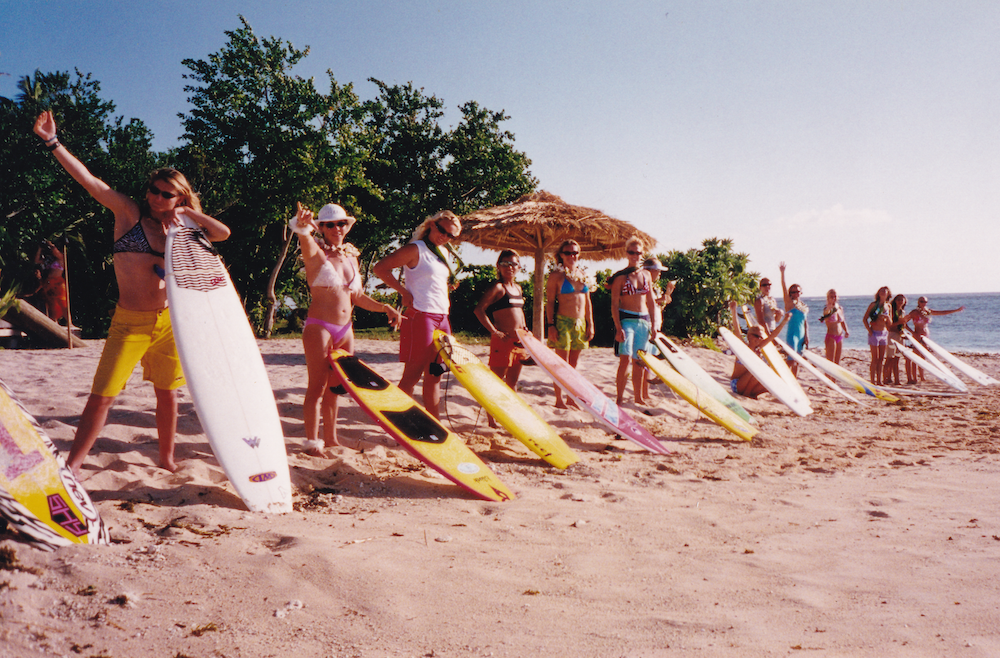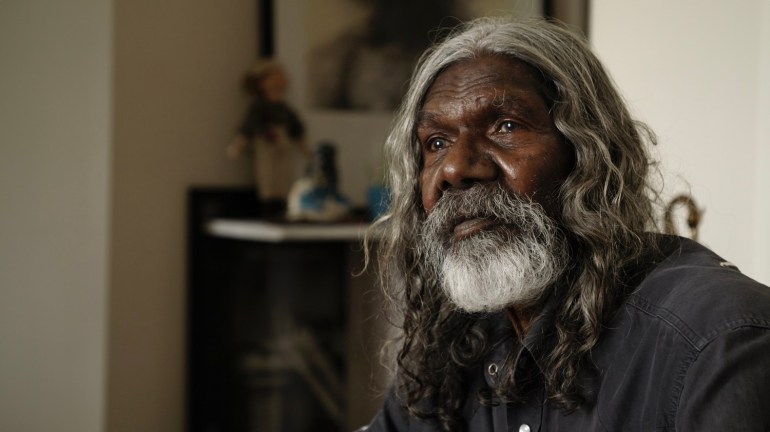Six films are set to vie for this year’s AACTA Award for Best Documentary, with voting for the winner open from today until August 2.
For consideration are Christopher Nelius’ Girls Can’t Surf, the highest grossing feature doc of the year so far; Sally Aitken’s Sundance-selected Playing With Sharks, and Molly Reynold’s My Name Is Gulpilil, a portrait of one of Australia’s leading actors, David Gulpilil.
They will compete against Matthew Walker’s I’m Wanita, about to premiere at the Melbourne International Film Festival following a HotDocs bow; Tosca Looby’s examination of the attacks that faced Julia Gillard in office, Strong Female Lead; and Jane Castle’s portrait of her mother, filmmaker Lilias Fraser, When The Camera Stopped Rolling.

As IF has reported, AACTA has adjusted its voting framework this year, with rounds per category staggered throughout the year.
The Best Documentary Award is first cab off the rank, with voting on short form, the major TV awards, major film awards, and the technical craft awards, including for documentary, to follow later this year.
All six nominated documentaries, chosen from a long list of 19, are available on AACTA TV for members to watch and vote for.

“After receiving a high calibre of entries across the category, we’re thrilled with this year’s six nominees for Best Documentary,” said AACTA CEO Damian Trewhella.
“They each tell a unique story, truly reflective of Australia and Australian voices. The nominees are a combination of inspiring, compelling, and thought-provoking. You won’t want to miss these incredible stories.”

Reynolds, who produced My Name is Gulpilil alongside Rolf de Heer, Peter Djigirr and Gulpilil, tells IF she is delighted by the nomination, arguing being able to stand alongside her documentary colleagues is already the real honour.
“After this, there are so many variables that come into play as to who seizes the statue, that I think this is the most significant moment in terms of the film’s journey,” she says.
My Name is Gulpilil sees Gulpilil, who has terminal lung cancer, tell his story in his own words. Still playing at select sites, it has grossed $407,496 in cinemas, and recently aired on the ABC as part of NAIDOC Week. For Reynolds, the overwhelmingly positive response to the film is a testament to Gulpilil as a world-class performer.
“I’m all the more filled with admiration and respect for David, because I think the nature of the response to the film is David’s performance; his hour and 40 minutes on screen. He holds it all – with a little help from [carer] Mary Hood, his sort of cinematic sidekick, so to speak,” she says.
“He’s got that charisma. He’s got that pull power. I’ve yet to find someone who really can name it, what David has.“

Girls Can’t Surf is one of many films that has had its release impacted by the pandemic; it was supposed to make its world premiere last year at the Tribeca Film Festival. However, it has done well theatrically since its release in March, ringing up $614,349 at the box office – making it not only the highest grossing feature doc of the year so far, but the ninth best performing local film.
The doco details how a group of women took on the male-dominated sport of professional surfing in order to achieve equality during the 1980s, and features interviews with the likes of Jodie Cooper, Frieda Zamba, Pauline Menczer, Lisa Andersen, Pam Burridge, Wendy Botha and Layne Beachley.
Michaela Perske of Perskey Productions came on board to produce the film with Nelius after, co-incidentally, running into him in the surf.
It’s a story that Perske wasn’t familiar with but was drawn to, in part because of the women’s tenacity and belief, and the bigger picture issues of equal rights. She is thrilled by the nomination, and that these women are being acknowledged and seen.
“It’s such a hard time to be getting a film out there and especially documentary films, because most people just imagine, ‘Oh, well, I’m going to see it on a streamer. It’s going to be somewhere else. Why am I going to pay $15 or 20 to go to a cinema?'” she tells IF.
“We got hit not only with COVID, then the floods all happened at the same time, all up and down the north coast. That knocked out a whole lot of screenings. But the film’s done really well; it’s got a really great audience. When you make a film about surfing, it’s a tough thing, because for people who aren’t into surfing they go, ‘Why do I want to see that film?
“But it’s actually not a film about surfing. It’s a film that has surfing at its heart, but it’s actually a much bigger story about feminism and equality, and so many other things.”

Full details of nominees:
Girls Can’t Surf, Purskey Productions, FINCH
Synopsis: It’s the 1980s and the world of professional surfing is a circus of fluoro colours, peroxide hair and radical male egos. Girls Can’t Surf follows the journey of a band of renegade surfers who took on the male-dominated professional surfing world to achieve equality and change the sport forever. Featuring surfing greats Jodie Cooper, Frieda Zamba, Pauline Menczer, Lisa Andersen, Pam Burridge, Wendy Botha, Layne Beachley and more, Girls Can’t Surf is a wild ride of clashing personalities, sexism, adventure and heartbreak, with each woman fighting against the odds to make their dreams of competing a reality.
Producers: Michaela Perske, Christopher Nelius
Director: Christopher Nelius
I’m Wanita, People Productions
Synopsis: I’m Wanita is the story of a renegade country music singer from Tamworth, Australia, hellbent on realising her childhood dreams of stardom. Self-crowned as ‘Australia’s Queen Of Honky Tonk’, Wanita is still waiting for the recognition she knows she deserves. Wanita embarks on a quest to record an album in the country music Mecca of Nashville, but her inability to toe the line threatens to derail her plans – can she keep her date with destiny?
Producers: Carolina Sorensen, Clare Lewis, Tait Brady
Director: Matthew Walker
Playing With Sharks, Wildbear Entertainment
Synopsis: Valerie Taylor is a living legend and icon in the underwater world. A glamorous shark hunter in the 1950s, she was a champion slayer with ruthless aim before a personal epiphany transformed her into a passionate marine conservationist – notably for the ocean’s scariest creature, the shark. Long before anyone else, Valerie dared to get close. This is her incredible true story, swimming against the tide of human misconception of sharks and putting herself on the front line for sharks for over 70 years. Featuring a stranger than fiction script, the making of Jaws, a magnetic heroine, and that most charismatic and terrifying of screen creatures, sharks; this powerful and visually sumptuous 90-minute feature documentary draws on incredible remastered film footage captured over 50 years.
Producer: Bettina Dalton
Director: Sally Aitken
My Name Is Gulpilil, Vertigo Productions
Synopsis: In what is very likely his final film, the great Australian actor David Gulpilil faces his own mortality: he is dying of lung cancer. Holding the camera figuratively in the palm of his hand, David performs directly for whoever might be out there in the future looking at him, to what is for him his final audience. He talks about what it is to stare down death, and what it was to live a life such as he did, a dizzying mix of traditional Aboriginal ways and modern Hollywood excess, and everything in between. It is pure, unmediated and unvarnished David Gulpilil, finally able to say in a film exactly what he wants to say.
Producers: Rolf de Heer, Peter Djigirr, David Gulpilil, Molly Reynolds
Director: Molly Reynolds
Strong Female Lead, Northern Pictures
Synopsis: One in three Australian women experience discrimination or harassment in the workplace. Australia’s first and only female Prime Minister, Julia Gillard, was one of them. In Australia, politics is a toxic place for women. Strong Female Lead examines Australia’s struggle with women and power when a strong female takes the lead. Using archival footage, we see the attacks, ever increasing in their vitriol and the sexual and violent overtones, that characterised her time in office and the gendered response of the public, media and Parliament itself to Australia’s first and only female Prime Minister.
Producer: Karina Holden
Director: Tosca Looby
When the Camera Stopped Rolling, Bower Bird Films, Freckled Duck Films
Synopsis: Lilias Fraser: a pioneer of Australian cinema who overcame huge personal challenges to make over 40 films in her lifetime. Her youngest daughter, cinematographer Jane Castle ACS, tells her mother’s story and that of their relationship using the rich textures of an unseen part of Australia’s cinematic history and her own highly personal cinematography. Tenacious, enthusiastic and ambitious, Lilias overcame huge systemic and personal obstacles in her lifetime. Like many pioneers, however, early childhood trauma drove her, and her life began to unravel over time. Becoming trapped in a destructive marriage then struggling with alcohol and single motherhood, Lilias’s trademark determination finally met its limits. When the Camera
Stopped Rolling documents both this trailblazing mother-daughter filmmaking team and the intergenerational trauma that was its shadow.
Producer: Pat Fiske
Director: Jane Castle


